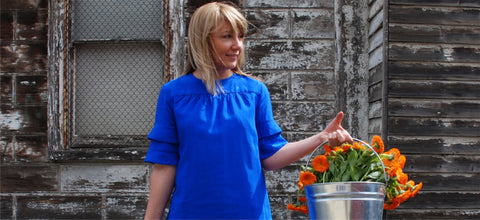
The average Australia female uses 12 skincare and beauty products before she leaves the house, every day. Amounting to over 124 synthetic and toxic chemicals in total.
If you are using conventional products, this equals 12 potentially toxic loads applied directly to your body. The skin is an organ of digestion, and the same way it digests nicotine through a patch, it absorbs these toxins into your bloodstream, where your circulation propels them into contact with every single cell.
By entering through the skin, these toxins also bypass the detoxifying bacteria, selective cellular barrier, and sensitive immune system in your gut, meaning they can be deposited and even stored throughout your tissues before your liver has a chance to metabolize and detoxify them.
Nourish your skin naturally
On the other hand, your morning ritual could be 12 opportunities to nourish your cells with plant-based non-toxic phytonutrient and antioxidant-rich shampoos, conditioners, soaps, lotions, oils, toners, moisturisers, foundations, eye shadows, lipsticks, blushes and perfumes.
Which would you choose? The answer is of course obvious, but most people don’t realise they're making this choice when they stock up on their daily regimen. Even many products that claim to be “natural” or are branded with seemingly eco-friendly packaging, are filled with potentially harmful or known-to-be harmful substances.
10 ingredients to avoid in skincare
You've probably seen variations of this list before, but to recap, here are 10 of the most problematic (and frequently used) ingredients to watch out for:
- Parabens—These are known hormone disruptors and estrogen-mimickers.
- Fragrance—There's actually no way to know what "fragrance" is. It's usually a proprietary blend and it's a way that companies often hide potentially harmful substances. Unless you 100% trust the brand, avoid it.
- Phthalates, including “dibutyl phthalate” in nail polish. These are known hormone disruptors in men and pregnant women.
- BHA (aka butylated hyrdroxyanisole). Banned in Europe, this substance has strong evidence of being a carcinogen and a hormone disruptor.
- Boric Acid or Sodium borate. Also restricted in Europe and known to disrupt male hormones.
- Heavy metals—now this is not a reference to music :) avoid heavy metals especially lead in dark hair dyes and mercury in some skin lighteners. Lead is a naturally occurring element in the ground and so many plant-based products may contain minute amounts of it. Ideally, all manufacturers test their botanical sources for heavy metal contamination, especially botanicals from overseas. High levels of heavy metals in the body disrupt biological detoxification processes and are linked with higher rates of everything from Alzheimer’s to cardiovascular disease.
- PEG aka “polyethelyne glycol” or “Carbomax Sentry.” PEGs are frequently used in household products and cosmetics and are often contaminated with 1,4-dioxane, a known carcinogen.
- Formaldehyde and formaldehyde releasers like Bromopol, DMDM Hydrantoin and Quanterium-15. Formaldehyde is a known carcinogen used commonly as a preservative.
- Preservatives that end in “-thiazolinone” like “Methylisothiazolinone,” for example, are skin irritants and there's some evidence that they may be neurotoxic.
- Triclosan and triclocarban in antimicrobial soaps can disrupt thyroid and reproductive hormones.
Overwhelmed yet?
You’re not alone!
It’s good to keep these harmful chemicals in mind when you shop, but if reading the fine print on every bottle has you cross-eyed, it’s understandable.
Here are 4 easy ways to eliminate these toxins from your life:
1. Put your mobile device to work.
An app called Think Dirty Shop Clean allows you to can scan a barcode and learn which products in your medicine cabinet are the worst offenders.
2. Do the research.
The Environmental Working Group has a great database of products called Skin Deep, where you can plug in tens of thousands of products and find out how harmful or clean they really are according to best the scientific research available. It's also available as an app.
3. Ask a trusted practitioner, like an integrative doctor or naturopath, for guidance.
He or she can review your products or recommend the ones they trust and love. In my practice, I’m always encouraging patients—men and women—to take a hard look at the soaps, cleaning products, body care, and makeup they use at home. I also personally use a “green” house cleaning service, Greenhouse eco-cleaning, which uses only non-toxic products.
4. Replace the products you use heavily and regularly every day like lotions and moisturisers first.
I make my own all over body, hair and moisturising oils - see a magical golden oil using extra virgin olive oil and mandarin oil, which is then infused in calendula. This one product replaces the need for so many others as I can use it as a leave in hair conditioner, an all over body moisturiser, bath oil, make up remover, after sun oil and the list goes on...
Take Care + Njoy!
Anastasia Skin Crusader

About the Author
Anastasia Lambadaridis is the founder and director of save our skin + the world we live in and is ardent about making a difference. Anastasia embarks on educational campaigns targeted at local community groups, parents and business networks… prompting people to make small changes in the home about the way they care about themselves + the planet. Anastasia is also not shy at exposing the truth behind the brands that lead the public to believe that their products are natural, good + healthy.

